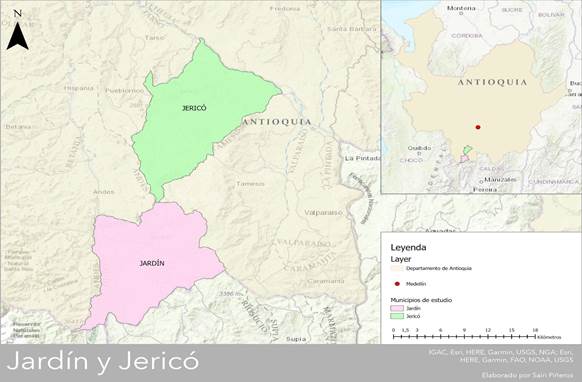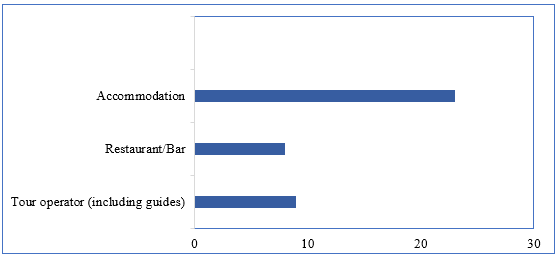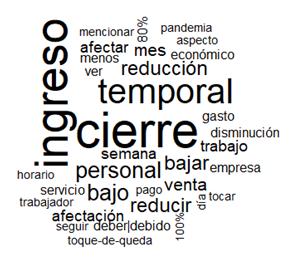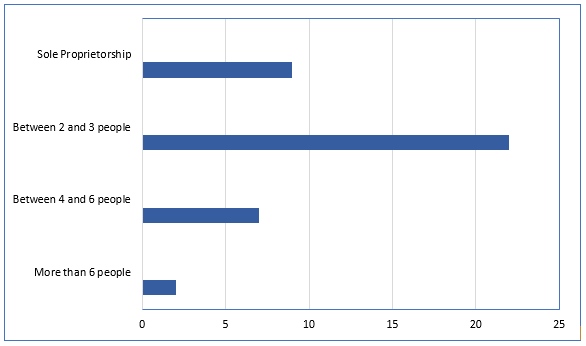Introduction
Since the emergence of the Covid-19 virus and its declaration as a pandemic in March 2020 (UNWTO, 2020), a series of measures were taken to contain the virus: the use of masks, constant hand washing, social distancing, confinement and quarantines, which resulted in the closure of borders and therefore the cessation of air and land transport operations at national and international level (Abuelafia et al., 2020). All this resulted in a drastic drop in tourism activity (UNWTO, 2020) international tourism dropped by 22% in the first quarter and came to a complete standstill in the second quarter, to finally have a very slight recovery in late 2020 and early 2021. All of this resulted in losses in the millions of dollars and put at risk the generation of income, the survival of companies in the sector and the loss of jobs for millions of people, thus affecting their quality of life.
In the Latin American context, according to estimations (CEPAL, 2020b), the impact of the cessation of operations is estimated to derive from the decline in tourism activities in the region, with a decrease in GDP growth of up to 8%, while total employment could decrease by 9% in the Caribbean and 2% in Latin America.
In the specific case of Colombia, according to Bonet et al. (2020) on the report on the regional economic impact of Covid-19 “the economic losses vary between $4.6 billion and $59 billion during the confinement period, which represents between 0.5% and 6.1% of the country's GDP, with services being the most impacted economic sector” (p. 2).
Due to this, the objective of this research was to identify the perception of the actors in the tourism sector chain on the impacts generated by Covid-19 in two municipalities in the department of Antioquia-Colombia, located southwest of Medellín (see Figure 1). According to data from the Secretaría de Turismo de Antioquia (2021), these two municipalities, Jericó and Jardin, have a high tourist vocation; for both regions tourism represents 80% of their economic activity, the other 20% is integrated by the agricultural sector, especially coffee, livestock and some other services.
In this order of ideas, for 2018, according to the Regional Tourism Competitiveness Index (ICTRC)5 , Jericó obtained an overall ICTRC of 4.97 with a very low performance in the business variable (1.48) and for its part, Jardín obtained an overall rating of 4.98 and the lowest performing variable was also business (2.23) (Centro de Pensamiento Turístico - Colombia, 2018a).
The research approach was qualitative, with an exploratory design and a phenomenological method. For the collection of information, an electronic survey was used through the Survey123 application of the ArcGIS Online platform. The participants were 40 tourism service providers (lodging, restaurants and tour operators). The analysis was carried out based on the open-ended responses to the survey, leading to the creation of categories and linking subcategories, which allowed a better understanding of the phenomenon studied.
This article shows the results of the research. For this purpose, the document has five parts, the first section presents the introduction, the second part deals with the reference framework, the third part deals with the methodology, the fourth part is the results, and the final part is the conclusions.
Frame of reference
Since the appearance of the SARS-CoV-2 coronavirus pandemic, social, economic and emotional impacts have been generated (Abuelafia et al., 2020) that have affected all areas of human life and sectors that energize the economy in the world. The tourism sector has not been the exception; on the contrary, it has been one of the most affected by the health emergency (Güliz & Akbıyık, 2020; UNWTO, 2021) and in the Latin American context it has generated a deep crisis in tourism activities affecting the entire value chain and deepening the socioeconomic gaps and problems in Latin America (CEPAL, 2020b; Navarro & Lorenzo, 2021 ). These changes have had an impact on the dynamics of tourism activities (Rivas et al., 2021) and therefore on the perception of the crisis by companies in the sector (Sánchez et al., 2021).
It could be said that the world is going through a health and humanitarian crisis unprecedented in the last century, in addition to an economic context full of adversities that since 2008 presented an economic and financial recession that has not been easy to overcome (CEPAL, 2020a) and that is currently worsening, generating a crisis in health systems, in the quality of life and in the well-being of people with serious economic impacts (UNWTO, 2021).
The recovery process will be long and will require coordinated efforts among all tourism stakeholders. However, it is important to note that throughout history tourism has demonstrated a great capacity for resilience, adaptability, creativity, innovation and recovery to face adversity, overcoming other crises in the past (UNWTO, 2020) and regaining the confidence of travelers and tourists (Demeyère, 2020).
In this context, the topics of reference of this article will be centered on two main axes: the perception of the crisis in tourism and the impacts of Covid-19 on this sector. To this end, first, a state of the art on the crisis and impacts of Covid-19 is presented, followed by the perception of the tourism sector.
The crisis and impacts of Covid-19
The crisis arises as a consequence of the confrontation of conflicting parties 5or of the situation in the context of an environment impregnated with uncertainty, risk and urgency (Giner, 2015). In a crisis process, it is a priority to analyze three main factors: the crisis scenario, the actors and the time elapsed (Rodríguez, 2006).
Until before the Covid-19 pandemic, some studies had been conducted on as impact of different epidemics: Ebola, SARS, AH1N1, Dengue, among others, on tourism (Latin America Digital Beat, 2009; Moya et al., 2014). Many of them focus on crisis management (Smith, 2006), while a few analyze the impacts of these epidemics on tourism activity (Novelli et al., 2018).
Faced with the impacts of the Covid-19 pandemic, studies have been conducted from multiple perspectives (Škare et al., 2021), in our particular case, on the crisis caused by Covid-19, there are the studies conducted on the impacts on hospitality (Hao et al., 2020), quarantine impacts (Rutynskyi & Kushniruk, 2020), employment impacts (Lopes et al., 2021) and job insecurity (Vo et al., 2021). On this last topic, it is necessary to mention that some authors suggest that post-pandemic tourism should improve working conditions in the tourism sector under the model of sustainability (Demeyère, 2020).
On the other hand, some authors instead have studied the strategies implemented to overcome the crisis in the tourism sector (Díaz, 2021; Sanabria et al., 2021), while others suggest that the crisis caused by Covid-19 is an opportunity to rethink the tourism model and its practices (Brouder et al., 2020; Castello, 2020; Cave & Dredge, 2020; Everingham & Chassagne, 2020; Galvani et al., 2020).
The perception of crisis in tourism and the impacts of Covid-19
Work on risk perception in tourism has mostly focused on studying risk perception in tourists (Wut et al., 2021); this includes risks from natural disasters (Rittichainuwat & Chakraborty, 2009) and human-induced: socio-political conflicts (Fuchs et al., 2013), health (Smith, 2006) and how these affect tourists' behaviors (Neuburger & Egger, 2021), e.g. fear of travel (Zheng et al., 2021), tourists' perception of safety about the destination (Xie et al., 2021) or how risk perception also affects the image of destinations (Yin et al., 2020). Similarly, studies have been carried out on the risk perception of local communities in relation to tourism activities in the context of a pandemic (Qiu et al., 2020) and the perceptions of tourism workers (Goh & Baum, 2021).
Regarding the impact of Covid-19 on the Colombian business environment, the Network of Cámaras de Comercio of Colombia - Confecámaras conducted a monitoring survey on the impact of Covid-19 on companies, in which the data is discretized by economic sectors (Confecámaras, 2021), but there is no specific information on the location of these companies, nor is there any specific information on the tourism sector. In the case of the study area, we found the results of a survey conducted by the Cámara de Comercio de Medellín para Antioquia (2020) 5, which is also generalized by economic sectors of the department of Antioquia, and which shows that 90% of the hotel and restaurant companies were not operating in April 2020. However, no further results related to the impact of Covid-19 on companies in the tourism sector are evident. On the other hand, tourism sector associations in hotels and travel agencies have collected information on the impact of Covid-19 on their affiliates, through some surveys (Anato, 2020a, 2020b; Cotelco, 2021). For the case of Anato, the survey conducted between June 16 and 26, 2020, indicates that there was an 18% reduction in the number of employees of travel agencies compared to before the crisis (Anato, 2020b, p. 15), while for the hotel sector the reduction has been 41% (Cotelco, 2021). These data show an overview of the situation of the members, however, they only show a small proportion of the reality, since many tourism service providers are not affiliated to these trade associations5. For this reason, we consider the need to focus this research on a more local scale, in order to deepen our knowledge of the impacts of Covid-19 on the tourism sector in the municipalities of Jericó and Jardín. This work will focus on the analysis of the perception of the crisis, from the perspective of tourism service providers in the two municipalities of study.
Methodology
For the development of the research, 40 organizations belonging to the tourism sector were contacted, such as tour operators, hotels, lodging and restaurants, located in the municipalities of Jericó and Jardín in the department of Antioquia-Colombia. Likewise, we had the support of the Secretaría de Turismo de Antioquia, in order to achieve an intermediation with the actors of the sector in each of these territories.
The research was conducted under the logic of a qualitative approach, with an interpretative paradigm, for Galeano (2009), the understanding, interpretation and perception of the realities of the participating subjects, is the basis from the perspective of an approach that is concerned with the subjective situations that each individual lives in their day to day, which makes it a research full of their own experiences, which allowed delving and knowing aspects found in the territories with high tourist vocation.
For Denzin & Lincoln (2012), in the qualitative research process, studies can be presented that are addressed in a single moment, which is defined as a cross-sectional type of research, i.e., its analysis and context was performed at one time, its design was non-experimental, since the interest is not to manipulate variables or perform control groups.
On the other hand, the phenomenological method was used, which for Martínez (2004), allows identifying the people's experiences, according to the context, the reality presented, according to what each individual can give meaning in their expression on a given topic, in this case, related to the perception of the crisis generated by Covid-19 in the tourism sector of the municipalities under study.
The information gathering instrument used was a semi-structured survey with open-ended answers, for Davies (2003), this type of technique is open, flexible and allows for a more in-depth collection of information on the phenomenon studied. This instrument was applied to the actors of the tourism sector in the territories defined for this purpose and was focused on determining the economic impacts of the crisis derived from Covid-19.
From the semi-structured survey it was shown that the entrepreneurs in this sector in the municipalities of Jericó and Jardín, not all of them have the National Registry of Tourism nor are they affiliated with the Chamber of Commerce of Medellín or its region, which prevents them from having a database updated with the necessary records for this type of research project. On the other hand, the application of the semi-structured survey was carried out via the Internet; due to the pandemic and quarantines; Face-to-face field work could not be carried out due to these situations, which did not allow direct dialogue with all the participants and a process of direct observation in the field.
Results
In this section, we present the results found from the instrument applied, i.e., the semi-structured survey. The results indicate that the effects of the Covid-19 pandemic have generated in the entrepreneurs of the tourism sector in the two municipalities analyzed, diverse situations and with high economic, social and health impact.
In this analysis, it was found that the categories analyzed allow for an integration between the economic situation of the actors in the tourism sector, with respect to income and labor commitments, employment generation, variation in sales and the economic situation of the company, which made it possible to show that the economic performance of a sector has negative effects, in this case, which have a direct impact on other economic and social activities. Figure 2 shows the type of tourism organizations that participated in the research.
We begin by analyzing the economic situation of tourism stakeholders in the two selected municipalities. Figure 3 shows the word cloud to the open question on economic impacts on tourism businesses due to the effects caused by the pandemic.
There, words such as "reduction", "decrease" are highlighted, all of which are associated with income and temporary closures.
The following is a detailed analysis of each of the categories mentioned, i.e., the economic situation, income and labor commitments, personnel, effect on sales and the company's current situation.
Economic situation: The closures and curfews have had a strong impact on the companies. During the first closure, some companies were unable to pay the full 6 months' salary to their employees and requested loans from the financial sector, which were not approved due to lower income. The mandatory shutdown and curfews have also prevented the normal development of work activities. The pandemic has left some companies in a complex economic situation, so much so that their owners are thinking of going into liquidation.
Effects on employment: There has been a total closure of tourism operating companies, leaving an average of 3 to 4 people and their families unemployed. People who were hired by the day have had to start working part-time or by the hour, which has had an impact on the employees' income. It is important to note that most of these jobs are temporary and were affected. High unreported employment in hiring represented 42% of the tourism service providers participating in the study, most of them with verbal agreement, without payment of social security. Temporary closures generated changes in schedules, therefore low salaries, income dropped by 98%, local employment generation plans went down the drain. Work on sustainability issues was suspended.
In this aspect on the impact on employment, Figure 4 shows the number of people working in the companies that were considered in the study before the pandemic and Figure 5 shows the number of workers during the pandemic.
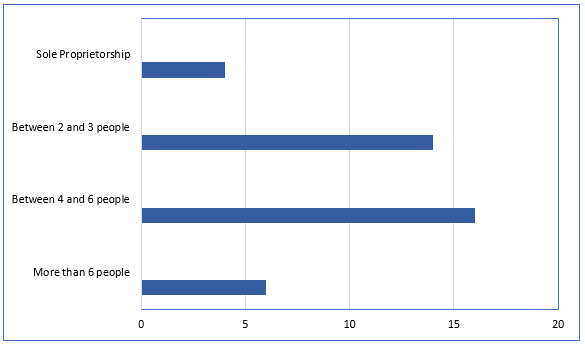
Source: Own elaboration on ArcGIS Survey123 (2021).
Figure 4 Number of persons employed in companies prior to the pandemic
Figure 5 shows the data regarding the decrease in personnel, especially in organizations with more than 4 workers (4 to 6 and more than 6 employees) and a concentration towards single-person companies, between 2 and 3 workers.
The strategies that companies in the sector had to implement with respect to personnel, the implications of job losses and the dismissal of employees due to the lack of economic activity are detailed in the findings.
Personnel: The situation that is most often repeated when companies are unable to open is the layoff, reduction and adjustment of the entire personnel, as well as the loss of an important learning curve after having had people for a long period of service. The situation of the reduction of personnel is not only to lay off, but it also generates an emotional and sensitive issue, many people are left without a livelihood for their families and will take time to find employment again in this sector, the same that must be recovered in order to generate employment and form a staff that will allow the companies' operations to survive. On the other hand, the effect of reducing the personnel or closing the company implies that women heads of household do not have income to support their families; likewise, since the companies do not have income, it is difficult for them to deliver the liquidation. Seventy-five percent of the entrepreneurs stated that their employees have a minimum wage.
Revenues and sales: Revenue and sales declines for 2021 relative to the same period in 2020 have decreased by an average of 90%, for this year total closures had a greater impact than at the beginning of the pandemic. Revenues on average for 2020 decreased by 80% compared to 2019. Likewise, this year 2021 the decrease is 50%. Sales for 2020 were affected by 90% and for 2021 by 50%. The businessmen state that both income and sales, making a comparison between 2019 and 2020, have decreased between 85% and 90%, 95% of the activities that the companies carried out are related to tourism, a sector that was one of the 5 directly affected by the pandemic.
Current situation of tourism: It is a complex situation, to recover what was not been done since the onset of the pandemic and the confinement measures, that is, March 2020 to the present. It is necessary to safely and actively reactivate the entire sector, creating strategies for tourists to return. There are already closures of companies, which generated 2 or 3 jobs, this has a direct effect on the generation of employment, productivity and quality of life of people in the municipalities. It is complex to continue sustaining companies and their operating expenses, since they do not have solid income and have debts with financial entities and cooperatives, as well as suppliers and employees. Each municipality should strive for a reactivation that involves all the actors in the sector, in order to listen to the needs and proposals that can be achieved for the benefit of the entire tourism chain. Some companies have closed temporarily, only this year 2021 are trying to resume their business work, it is a complex scenario for the companies participating in the study, but it requires effort and commitment to restart with all the reactivation, we hope that 2021 in the second half will be positive and favorable for all entrepreneurs in the sector.
Finally, Table 1 summarizes the impacts according to the categories studied:
Table 1 Summary of impacts by category
| Study categories | Findings |
| 1. Economic situation | Drastic decrease in revenues. High operating costs that are difficult to maintain. Partial or definitive closure. unreported employment |
| 2. Effect on employment | Decrease in the supply of employment. Increased unreported employment in hiring and social security payments. |
| 3. Staffing | Layoffs. Fewer personnel. Increased workload. Modification of work schedules. Emotional impacts. |
| 4. Revenues and sales | Decrease in sales of tourism products and services, even reaching zero. |
| 5. Current situation of the tourism sector | Articulation of the value chain. Deficiency in infrastructure. Deficiency in the health and sanitary system. Investment in adjustments for biosafety protocols. Recovery of confidence. Support policies of public and private institutions, insufficient sources of financing. |
Source: own elaboration on ArcGIS Survey123 (2021).
Conclusions
In the process of analyzing the information, direct effects generated by the Covid-19 pandemic are evident. These are mainly expressed in the sustainability and permanence of companies in the tourism sector in the short term, i.e., there is a financial and income weakness, which is generating unemployment in the region. Although the pandemic affected all sectors, the tourism sector is in a high range of affectation, thus, tourism companies located in these two municipalities of the department of Antioquia do not have action plans and response to these external threats, which leads to the option of reducing staff, closing and liquidating the company in the short term.
It is evident that the municipalities of Jericó and Jardín have a high potential for development and tourism vocation, but they must formalize and strengthen aspects of the entire value chain of the tourism sector. It is therefore relevant to seek training support from the Secretaría de Turismo de Antioquia, where support is provided from the preparation and training for the actors of the sector, in order to take advantage of some of the competitive advantages that these two regions have in tourism.
It is also evident that the entrepreneurs in this sector did not contemplate the development of other types of business activities, since these two municipalities Jardín and Jericó have a tourist vocation of 80%, which indicates that they do not have plans to diversify the offer in other types of industry and therefore become dependent on the tourism sector.
On the other hand, strategies such as strategic alliances or productive linkages can be created by the Mayors of the municipalities of Jardín and Jericó, as well as by the Secretaría de Turismo de Antioquia, so that there is an articulation of all the actors of the tourism sector, which allows a productive dynamic for the different types of businesses that exist in the region, such as: coffee farms, recreational farms and spaces such as religious museums, among others.
The results are related to the current situation of the tourism sector, where there is a feeling and a negative perception about the future of the productive units located in the municipalities of Jardín and Jericó. Each municipality should strive for a reactivation that involves all the actors in the sector, in order to listen to the needs and proposals that can be achieved for the benefit of the entire tourism chain.
On the other hand, the challenge for the actors of the tourism sector is to learn from this current reality, how is a pandemic that had and still has a global impact, which leads to proposing financial strategies and alternatives to achieve sustainable self-financing and where possible to take advantage of times of good financial results and thus protect and shield themselves in times of low income and therefore subsequent decreases in profitability.
With a view to other investigations, it is possible to contemplate expanding the sample and making statistical comparisons on the formality and informality of the companies that belong to the tourism sector, in order to find aspects that affect the consolidation of the entrepreneurs that are in this sector. of the economy.
On the other hand, other research topics can be considered under the tourism line, considering economic, financial and administrative aspects, which have deep data where a broad analysis is achieved based on statistical aspects, which allows an integral context of the tourism sector in the municipalities of a certain department or taking a representative sample of the country.
Likewise, a broad theoretical basis can be proposed, in order to carry out an in-depth analysis regarding the analysis of the tourism sector, from the contribution they make to the growth and consolidation of income to the country's gross domestic product.














